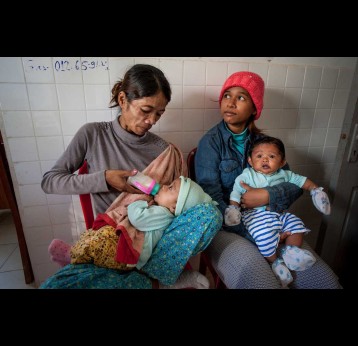Evaluation objectives
The evaluation assessed the Policy design, the efficiency of its implementation during the period 2014 – 2018 and the results that were achieved. Though a summative evaluation, the evaluation findings are also informing a review of the Gavi Gender Policy that is currently taking place.
Methods
The evaluation adopted a theory-based approach to explore five evaluation questions and associated sub-questions. Mixed methods were used for data collection, including a detailed study of eight focal countries, key informant interviews (KIIs), a survey to Gavi Secretariat staff and a best practice analysis of comparison organisations.
Findings and conclusions
The evaluation presents 15 findings and seven recommendations, which were discussed with stakeholders at a co-creation workshop in March 2019 (please see the report for more details).
Theory of Change
The evaluation found that the Gender Policy’s ToC broadly reflected Gavi’s intentions at the time. The four strategies depicted were regarded as reasonable approaches to build country capacity for gender-sensitive immunisation. However, some aspects of the programme theory had not materialised as expected. This is due to some underlying assumptions not holding true and an insufficient articulation of a pathway from inputs to outputs and outcomes and which limited the ability to monitor progress in policy implementation
Relevance
Gavi’s Gender Policy is relevant to global and country efforts to promote universal immunisation coverage and gender equality. The policy has responded to evidence that showed gender-related barriers are the key issues in inhibiting access to immunisation. The Policy is also aligned with international goals (including SDG 3). The evaluators highlighted four ways in which the Policy’s relevance can be strengthened going forward:
- Better reflection of country concerns and differences;
- A clearer and more convincing articulation of how addressing gender issues in immunisation will contribute to the achievement of Gavi’s global mission and strategic objectives, referencing available international and national evidence;
- A clearer articulation of Gavi’s ambition in relation to gender-sensitive and gender-transformative approaches, backed by international and national evidence of what works in different contexts;
- More robust arrangements to support Gender Policy implementation.
Efficiency
Key Gavi figures are committed and provide visible leadership to the Gender Policy’s implementation. The Gender Working Group (GWG) has made good efforts to drive and coordinate policy implementation within the Secretariat and has facilitated the achievement of some important milestones. However, , the GWG has lacked the level of prioritisation and the resource commitment required to efficiently translate the policy commitments into action. The evaluators recommend enhancing internal Secretariat systems and processes including appointing an experienced gender and equity specialist dedicated to supporting the Alliance in implementing the Gender Policy.
Effectiveness
Gavi has recently increased its participation in global advocacy and dialogue processes to ensure that language that addresses gender related barriers to health services is incorporated into various multi-stakeholder agreements and compacts. The Secretariat has achieved a reasonable level of attention to improve country understanding and addressing gender-related barriers through the development of programmatic guidance documents on gender.
However, for this to result in gender-related barriers being addressed in programming, they also need to be explored in country dialogue to enable partners to develop their understanding. To date, the Alliance has tended to prioritise other drivers of inequities, including geographic equity, and has, for the large part, allowed countries to dismiss the importance of gender issues in providing access to immunisation and in improving overall immunisation coverage. The evaluation recommended making equity assessments a requirement for HSS support, and working with country partners to develop a detailed understanding of the gender-related and other barriers to immunisation access.
For the evaluation recommendations and Gavi Alliance management response please see the full report and Evaluation Management Response.
Related content
Gavi works with countries to address gender-related barriers, and ensure all boys and girls have equal access to vaccines
Gavi has committed to increasing immunisation coverage by supporting countries to overcome gender-related barriers to accessing immunisation services and promoting equity of access for all genders to immunisation and related health services that respond to their different needs.
This report presents the findings and lessons from an evaluation of the Gavi Gender Policy. The evaluation was conducted in 2012 by ICF Macro, Inc.


